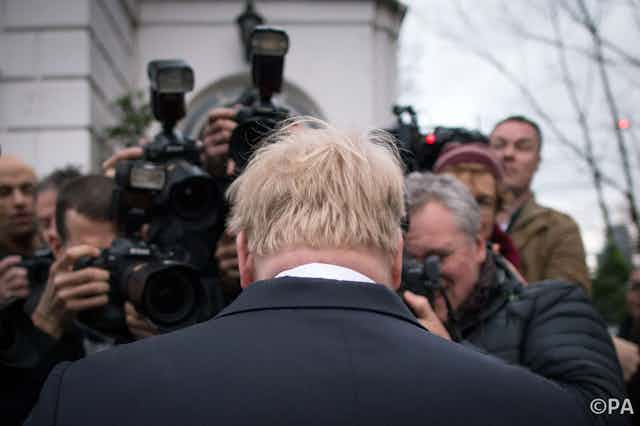Like all successful gamblers, Boris Johnson knows how to play the hand he is dealt, clearly calculating the odds of success. The London mayor’s decision to break with David Cameron to become a figurehead of the Leave side in the forthcoming EU referendum is the product of untold hours of calculation.
When Boris tells us that the referendum presents us with “a once in a lifetime chance”, we should believe him. If he has made the right calculations, Boris could become the next British Prime Minister. Let’s have a look at what those calculations might have been.
Doing the sums
We don’t know what Boris really thinks about Brexit but we can assume that he is more of a eurosceptic than an outright europhobe like former environment minister Owen Paterson. Nevertheless, he has placed himself on the side of what is sometimes called hard euroscepticism in his clear commitment to leave the EU.
We also don’t know who is going to win the referendum on June 23. In the Scottish referendum the No camp enjoyed a lead in the polls throughout the campaign. But the use of fear and negative campaigning does not seem to be having the same impact in the EU referendum. So the polls remain close.
We do know, however, that Boris very much wants to be Prime Minister. And given the current state of the Labour Party, securing the leadership of the Conservative Party makes Boris Prime Minister. So let’s give that outcome a value of 1.
Let’s also assume that Boris would like his position on Europe to be supported by his party and also by the British people. Let us be generous and give both of those objectives a value of 1 as well. This gives us a decision matrix based on the two options: support “Remain” (Option 1) and support “Leave” (Option 2).

Given the state of the polls, whichever direction Boris chose to jump there is a good chance that he would end up on the losing side. So for the sake of argument, let’s give a value of 0.5 (reflecting a 50/50 chance) of either Option 1 or 2 being supported by the British people.
We also assume that Boris wants his position to be supported by his Conservative Party colleagues. We know that up to 100 backbenchers are Brexit supporters and the real number is probably higher than that. And although the majority of Conservative activists were willing to support the Prime Minister’s renegotiation, those members who are most willing to campaign are also those most likely to back leaving if the renegotiation fails. Therefore, for the sake of argument, we should assign a value of 0.5 to both options, although the momentum within the Tories is clearly with the Leave camp.
Plain sailing to Number 10?
So what about Boris’ chances of becoming leader of the Conservative Party? Here it is clear that opting for Leave has drastically shortened the odds to 1/3.
One of the interesting consequences of the Labour Party’s current problems is that David Cameron’s status as an electoral asset – more popular in the country than the party he leads – is less important than usual. Without meaningful opposition, backbench MPs are less reliant on their leader to keep hold of their seats. This makes Cameron more vulnerable to a leadership challenge after the referendum, regardless of the outcome, and he may well resign if the public votes to leave.
In any leadership battle, the bookies have Boris, chancellor George Osborne, and home secretary Theresa May as the current favourites. Both Osborne and May have come out in favour of Remain. Coming out in support of Cameron’s position would have won Boris some short-lived praise for statesman-like behaviour and negation of personal ambition but it would have failed to differentiate Brand Boris from its competitors.
If he had done this and the Great British Public voted Remain, the majority of the plaudits would go to Cameron and the political capital would probably flow to Cameron’s preferred successor Osborne. Conversely, whatever the result of the referendum, Boris coming out in favour of Leave places him at the helm of the increasingly dominant faction in the Tory party and well placed to win the subsequent leadership election.

We’re not mind readers, but adding up the scores in the simple decision matrix gives us some idea of Boris’ calculations: “Remain” (1.3) loses out to “Leave” (2.0). But these are unweighted scores. It is reasonable to assume that Boris’ preferences are very, very much in favour of becoming leader of the Conservative Party. So let us give this a new score of 3. If he can do this whilst staying onside with the rising forces within his party so much the better. Let us give this a new score of 2.
But it is not necessarily a disaster if Boris’ position is at odds with the final decision of the British people. The Labour Party’s current weakness and the disproportionate effects of Britain’s first-past-the-post electoral system mean that the next Tory leader will almost inevitably be the next Prime Minister. So let us keep this score at 1, in that it is desirable but by no means essential to Project Boris. Adding up these scores gives us a clear victory for “Leave” (4.5) over “Remain” (2.4). Boom! (as the classically-educated Boris probably didn’t think to himself), coming out in favour of Brexit is not such a gamble after all.

